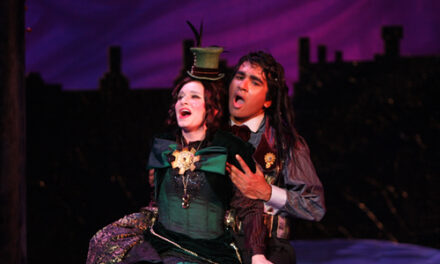Where does one go once he or she reaches the top?
Pessimists glued to their televisions watching the battle of the network news stations would say that the only way to go is down. But audience members at Saturday’s Eastern Festival Orchestra concert, which closed out the 2016 season, found another answer: this organization is not yet at the top.
This, I should clarify, is a good thing. Across the board, those who go to an Eastern Music Festival concert are changed: it is an experience, with quality that rivals the top-tier orchestras in the country and programming that is both creative and challenging for its players and audiences. One never really does know what to expect. Rather, the journey is the fun part – getting to that moment of pure elation about the music.
Closing out the season, Maestro Gerard Schwarz programmed a concert around the concept of a journey. There was the piece about a quest: the orchestral excerpts from Wagner’s Götterdämerung included Siegfried’s Journey down the Rhine river. There was the piece about the exploration of the human heart in Rachmanioff’s Piano Concerto No. 2. Finally, there was a work that involved the self-reflection of a composer’s own future with Copland’s Symphonic Ode.
The Ode, written when Copland was 29, is a dissonant exploration of the composer’s budding style and sound – one that merges Copland’s fascinations with Mahler and Stravinsky (in the orchestration and rhythmic experimentations) with reflections on his youth in the jazzy and Jewish sounds heard throughout the piece. The orchestra performed this lesser-known work with fierce control, and Maestro Schwarz’s conducting flourishes were more restrained so as to help navigate the orchestra through the difficult metric changes.
To compensate for the prolonged logistics of moving a grand piano onto the stage, the Wagner was performed in place of the Rachmaninoff. The Ring is a momentous work, Götterdämerung being the fourth and final work in the cycle. It is a daunting task, to close out an operatic cycle of nearly 100+ characters and 16 hours of music. Daunting too is the task the orchestra has playing the piece, for Wagner’s excerpts are interludes from the opera and written in such striking narrative strokes of genius, the imagery can be seen even when the playing is not the most passionate.
The EMF orchestra suffered from this – a product (I surmise) of not being warmed-up enough to pour their hearts into the work. The passion was there, but only in sparks, such as the “Siegfried’s Funeral March,” which created thick tension and swelled into playing the height of German Romantic music. The rest of the movements were technically well played, though lacked the passion the music of Wagner demands.
The lust and power lacking in the Wagner was quickly made up for during the Rachmaninoff with soloist William Wolfram breaking the glass ceiling of other performances of this piece. Whereas other soloists see the concerto as a Romantic work, about being in love and losing it, Wolfram’s interpretation gave the work the feeling of a tormented soul grappling with feeling angered and regretful about love(s) lost. At least, it was Wolfram’s heart-wrenching playing that brought these images to my mind. It was a performance to remember. Wolfram has been a favorite at EMF for nearly 5 years, with many audience members being devoted fans and followers. The consistency of Wolfram’s intensity throughout the piece gave the work the new dimensions and the audience more reasons to cheer at this year’s closing – we must now wait 12 months for the next.
Next year brings Maestro Schwarz into his tenth season with EMF and will most likely promise the return of familiar faces and friends from his tenure. EMF is top tier, yes, but the future of its legacy in Greensboro will be something to watch in the company’s next steps.
Look homeward, angels; a new chapter awaits.











